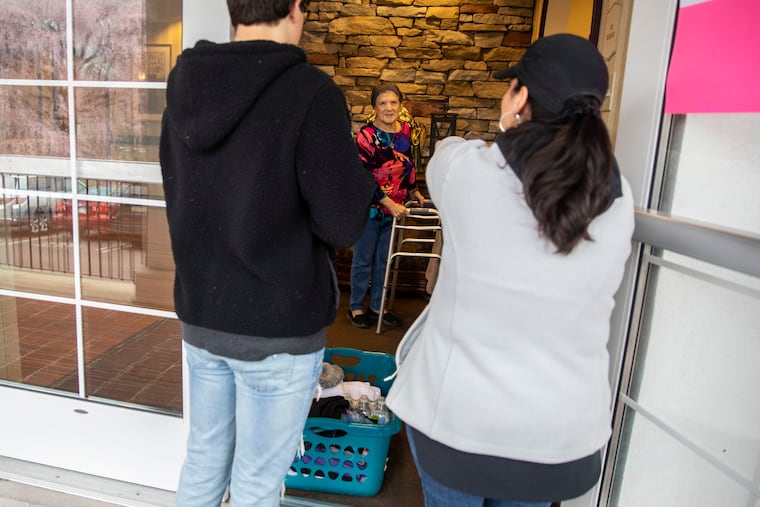How older adults and caregivers can weather the coronavirus pandemic | Expert Opinion
Have a plan B, keep important documents handy, and other tips from physicians during this pandemic.

In these times of uncertainty, it can be challenging to know how to prepare yourself and your family for illness, continued self-isolation, or potentially long periods of disruption due to restrictions on business and local services. These situations can be especially challenging for older adults, many of whom might have underlying medical problems that put them at higher risk for infection or serious illness with COVID-19. In addition, many older adults rely on the help of a caregiver to navigate day-to-day life. At this stage of the pandemic, older adults and caregivers should take the following steps to prepare for the impact on their community.
Stay informed. It is important to call your specific medical providers to understand how they will be handling routine and urgent health care—are they seeing patients in the office, doing telephone visits, or video visits? If you have home health providers come to your home, will they still be coming as scheduled? Keep up with federal, state, and local guidance.
Make a Plan B. Think about what will happen if you or your caregiver should become ill, or if they are unable to leave their home because of self-quarantine or other issues. Will you need help at homhospiif you become ill? If so, who will be able to help you? What is your plan in case your caregiver becomes ill or isn’t able to help you for a few weeks? Who will help with tasks, like cooking, cleaning, or bathing, if you or your caretaker becomes ill? It is important to finalize a plan for how you will get vital care and supplies. Consider setting up a meal delivery service or grocery deliveries.
Collect necessary documents. In case you get very ill and need to seek medical care, you need to have copies of important paperwork available. Caregivers can help collect these documents and ensure that they are available for healthcare providers to review. Consider completing a care plan that lists your medical conditions, allergies, and contact information for family members or other caretakers. Your care plan should also include an updated list of your medications, including dosages. You might consider having a copy of your identification and insurance cards, recent medical records, and other important documents, such as “power of attorney” or “do not resuscitate” information.
» READ MORE: How to help older relatives use video calling during coronavirus
Prepare an emergency supply kit. If possible, you should possess at least a one-month supply of all of your prescription medications, in case illness makes you unable to leave your home, or restrictions where you live limit your ability to access a pharmacy or your doctor’s office. Check your medications carefully and notify your doctor if you need refills on any daily medications. Make sure you have hearing aids and extra batteries, glasses or contact lenses, or medical devices (such as a walker or cane) available in your home. Also make sure you have enough of any medical supplies that you use regularly, such as a glucometer and test strips for testing blood sugar, alcohol swabs or needles for injectable medications like insulin, or pads for urinary incontinence. Also consider purchasing a thermometer or over-the-counter medications..
» FAQ: Your coronavirus questions, answered.
Communicate about your care preferences. Talk with family, caretakers, and your doctors about your health, and make sure they know how you would want to be cared for if you were to become seriously ill. It may be helpful to determine who will help you make health decisions in an emergency situation. Make sure your caretakers have a copy of any health care paperwork.
Know what to do if you or family/caregiver get sick. If you develop symptoms of a COVID-19 infection, such as fevers, cough, muscle aches, nausea, vomiting, or diarrhea, contact your doctor’s office or your local health department prior to seeking care; a health provider will direct you to appropriate care or testing. If you develop severe symptoms, call 9-1-1 or go to the closest hospital. Notify providers or emergency personnel that you are concerned about coronavirus.
» READ MORE: Philadelphia-area stores with dedicated hours for seniors, pregnant women and the immunocompromised
Avoid close contact with anyone who feels ill. If your family or caretaker becomes sick, create a plan for limiting your contact at home (such as sleeping in a separate room, and frequently cleaning surfaces you might have touched).
Stay connected and help others get prepared for an emergency. Social connections are extremely important for maintaining your physical and mental well-being, and can be kept while “social-distancing.” This is a time to renew relationships with friends and family through phone calls or video chats.
Mariana Gonzalez, MD, MPH, is a Geriatrics Fellow at the University of Pennsylvania’s Perelman School of Medicine. Mariana.Gonzalez@Pennmedicine.upenn.edu. Rachel K. Miller, MD, MsED, is an associate professor of Clinical Medicine in the Division of Geriatrics at Perelman. Rachel.Miller@pennmedicine.upenn.edu.